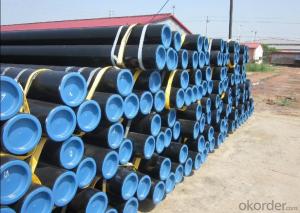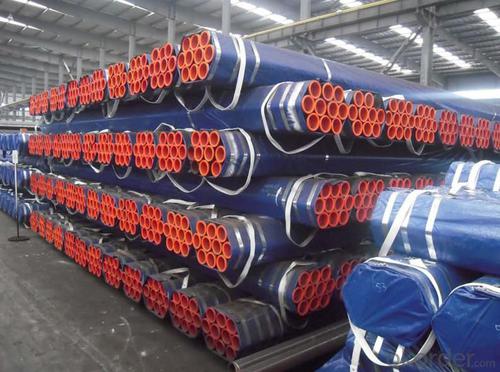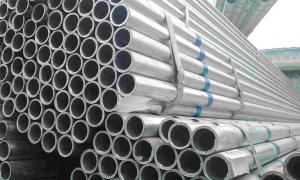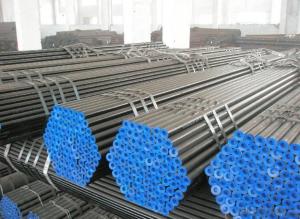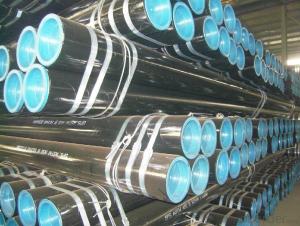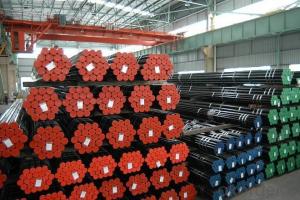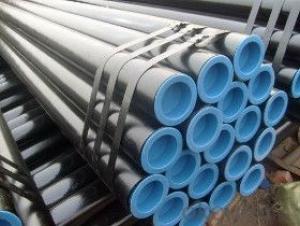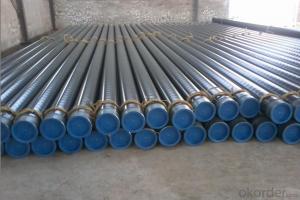Seamless pipe API,GB,ASTM,ASME,DIN high quality
- Loading Port:
- Tianjin
- Payment Terms:
- TT OR LC
- Min Order Qty:
- 10 m.t.
- Supply Capability:
- 5000 m.t./month
OKorder Service Pledge
OKorder Financial Service
You Might Also Like
1. Commodity Name: Seamless steel pipe
2. Standard: API,GB,ASTM,ASME,DIN
3. Quality grade: 10#, 20#, A106B, A53B, API 5L B, Q235, Q345, ST37-2, ST 45, ST52.etc.
4. Dimension:
OD: 1/2"-24"
WT: 2.5-80mm, SCH10~SCH40~XXL
length: 5.8m,6m,8m,9m,12m
5. Technique: Hot Rolled/Cold Rolled/ Cold Drawn
6. application
carbon seamless steel pipes are widely used in gas, water and oil, transpotation;constructions;Bridge,highway,windows of model steel door; building materials;fences;heating facilities Fluid Pipe;conduit pipe,scaffolding pipe.etc.
7. Payment Terms: L/C D/A D/P T/T
8.packing and shipment
Packaged in bundles,as per customers' requirements, it can also bepackagesd as beveled ends, typed marking, black painting, plastic caps protection,woven bags packing
For 20" container the max length is 5.8m; For 40" container the max length is 12m. other options are available based on customer requests. Please discuss when placing orders.
9. Surface: painted with varnish;
10. Plastic caps at ends.
11. Tolerance: OD +1%/-1%
WT +12.5%/-10%
12. Chemical composition:
Models of Steel Pipes | Chemical Component | |||||||
Steel 20 (ASTM A106B) | C | Si | Mn | P | S | Cu | Ni | Cr |
0.17~0.24 | 0.17~0.37 | 0.35~0.65 | 0.035max | 0.035max | 0.25max | 0.25max | 0.25max | |
Steel45 (ASTM 1045) | 0.42~0.50 | 0.17~0.37 | 0.50~0.80 | 0.035max | 0.035max | 0.25max | 0.25max | 0.25max |
16Mn(Q345B) | 0.12~0.20 | 0.20~0.55 | 1.20~1.60 | 0.035max | 0.035max | 0.25max | 0.25max | 0.25max |
45Mn2 ( ASTM1345) | 0.42~0.49 | 0.17~0.37 | 1.40~1.80 | 0.035max | 0.035max | 0.3max | 0.3max | 0.30max |
- Q: How do steel pipes compare to other materials like PVC or copper pipes?
- Steel pipes have several advantages over other materials like PVC or copper pipes. Firstly, steel is a very strong and durable material, making steel pipes ideal for handling high-pressure applications. They can withstand extreme temperatures and are resistant to corrosion, making them suitable for both indoor and outdoor use. PVC pipes, on the other hand, are not as strong and are more prone to cracking and breaking under pressure or in extreme temperatures. Copper pipes, though durable, can be susceptible to corrosion and may require additional protective coatings. Secondly, steel pipes have a longer lifespan compared to PVC or copper pipes. They are known for their longevity and can last for several decades without needing replacement. PVC pipes, while relatively inexpensive, have a shorter lifespan and may need to be replaced more frequently. Copper pipes, though durable, can also corrode over time and may require maintenance or replacement. Another advantage of steel pipes is their ability to handle a wide range of fluids and substances. They are commonly used in industrial applications where there may be chemicals or corrosive materials present. PVC pipes, on the other hand, may not be suitable for handling certain chemicals or substances as they can react and cause damage to the pipe. Copper pipes, while generally safe for carrying water, may not be ideal for conveying certain chemicals or fluids. Additionally, steel pipes have excellent fire resistance properties. In the event of a fire, steel pipes can withstand high temperatures and maintain their structural integrity, ensuring the safety and protection of the surrounding area. PVC pipes, on the other hand, can melt or deform under high heat, potentially causing structural damage. Copper pipes, while not as prone to melting, can still be affected by extreme heat and may lose their strength. However, there are a few drawbacks to steel pipes as well. They tend to be heavier and more difficult to install compared to PVC or copper pipes. Additionally, steel pipes can be more expensive upfront, especially when compared to PVC pipes. However, considering their durability and longevity, steel pipes may offer better value in the long run. In conclusion, steel pipes offer several advantages over other materials like PVC or copper pipes. They are strong, durable, resistant to corrosion, and have a longer lifespan. They can handle high-pressure applications and a wide range of fluids, making them suitable for various industrial and commercial uses. While they may be more expensive and difficult to install, the benefits of steel pipes make them a reliable and cost-effective choice in many applications.
- Q: How are steel pipes used in the construction of highways?
- Steel pipes are commonly used in the construction of highways for various purposes, such as drainage systems, culverts, and sign supports. They provide a durable and efficient solution for transporting stormwater and preventing damage to the road surface. Additionally, steel pipes are utilized to support highway signs and traffic signals, ensuring their stability and longevity.
- Q: What are the different coatings used on steel pipes?
- There are several different coatings used on steel pipes, including epoxy coatings, polyethylene coatings, zinc coatings, and fusion bonded epoxy coatings. These coatings are applied to protect the steel pipes from corrosion and extend their lifespan.
- Q: Can steel pipes be used for steam applications?
- Yes, steel pipes can be used for steam applications. Steel is a widely used material in steam systems due to its high strength, durability, and resistance to high temperatures and pressure. It is commonly used in industries such as power generation, refineries, and petrochemical plants for carrying and distributing steam. However, it is important to ensure that the steel pipes are properly designed, installed, and maintained to withstand the specific conditions and requirements of steam applications.
- Q: Are steel pipes affected by magnetic fields?
- Yes, steel pipes can be affected by magnetic fields. Steel is a ferromagnetic material, which means it can be magnetized and influenced by magnetic fields.
- Q: Can steel pipes be used for heating and cooling systems?
- Yes, steel pipes can be used for heating and cooling systems. Steel pipes are commonly used in HVAC (heating, ventilation, and air conditioning) systems as they have excellent heat transfer properties, durability, and can withstand high-pressure conditions. Additionally, steel pipes are resistant to corrosion, making them suitable for both heating and cooling applications.
- Q: What are the factors to consider when selecting steel pipes for a specific application?
- When selecting steel pipes for a specific application, factors such as pipe diameter, wall thickness, material grade, corrosion resistance, temperature and pressure requirements, environmental conditions, and cost should be considered. Additionally, factors like durability, strength, weight, ease of installation, and compatibility with other components in the system should also be taken into account.
- Q: How are steel tubes represented?
- If you speak of steel pipe, if it is water. Gas transmission pipe, then it is said: nominal diameter refers to the inner diameter. The units are millimeters or inches. [for example, water pipes with phi 25. It means that the nominal diameter (diameter) is 25mm (or an inch) steel pipe.
- Q: What is the fire rating of steel pipes?
- Several factors determine the fire rating of steel pipes. Steel possesses inherent fire resistance due to its high melting point and low thermal conductivity. However, the fire rating of steel pipes can be further improved by employing fire-resistant coatings or insulation materials. These additional measures can offer different levels of fire protection, typically quantified by how long the pipes can retain their structural integrity during a fire situation. The precise fire rating of steel pipes may differ depending on the thickness and type of coating or insulation employed. To ascertain the appropriate fire rating requirements for specific applications, it is crucial to refer to industry standards, such as those established by organizations like the National Fire Protection Association (NFPA), or consult with fire safety professionals.
- Q: Are steel pipes suitable for food processing facilities?
- Yes, steel pipes are suitable for food processing facilities. Steel pipes are widely used in the food processing industry due to their numerous benefits. Firstly, steel pipes are highly durable and can withstand high temperatures, pressures, and corrosive substances often used in food processing. This ensures the pipes will not degrade or contaminate the food products. Additionally, steel pipes are easy to clean and maintain, making them ideal for maintaining high levels of hygiene required in food processing facilities. Steel pipes also have excellent resistance to bacteria growth, further ensuring the safety and quality of the food being processed. Furthermore, steel pipes are cost-effective and have a long lifespan, making them a reliable and economical choice for food processing facilities. Overall, steel pipes are a suitable and preferred option for food processing facilities due to their durability, cleanliness, and resistance to contamination.
Send your message to us
Seamless pipe API,GB,ASTM,ASME,DIN high quality
- Loading Port:
- Tianjin
- Payment Terms:
- TT OR LC
- Min Order Qty:
- 10 m.t.
- Supply Capability:
- 5000 m.t./month
OKorder Service Pledge
OKorder Financial Service
Similar products
Hot products
Hot Searches
Related keywords

